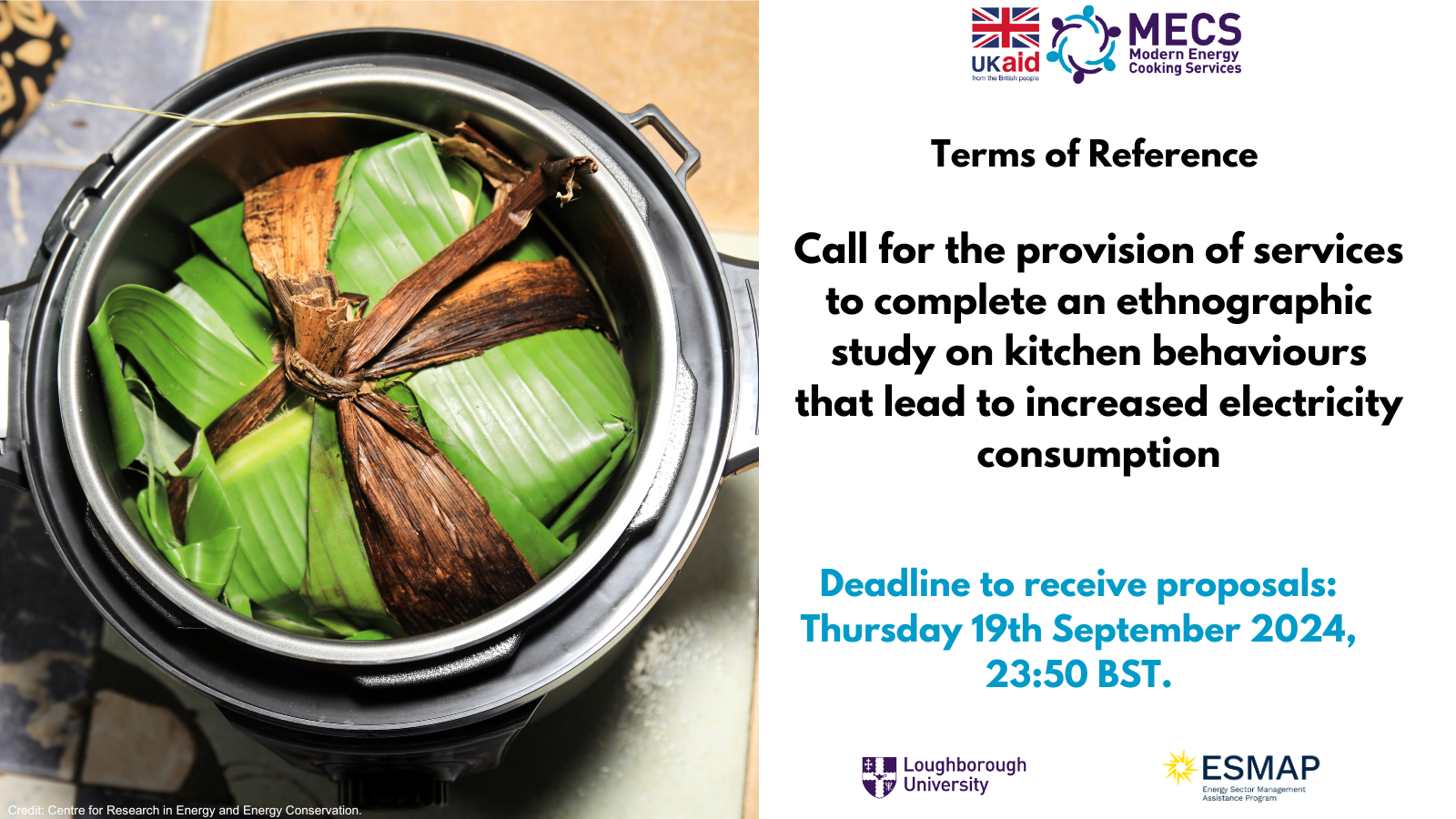
- Date
- 2nd September 2024
- Categories
- General
MECS is pleased to announce the call for the provision of services to complete an ethnographic study on kitchen behaviours that lead to increased electricity consumption.
Project Outline/Introduction
Modern Energy Cooking Services (MECS) Programme, funded by UK Aid (FCDO), aims to accelerate a transition from biomass to genuinely ‘clean’ cooking with electricity or gas. The transition to cooking with clean and renewable electricity is strongly driven by its potential to become affordable in the near future. The affordability of cooking with electricity depends not only on the efficiency and characteristics of appliances but also on the daily behaviour of their users. For instance, the study by Oliveira (2012) found that actions made by cooks can increase electricity consumption more than three times than necessary to complete the cooking task. While recent long-term data measured directly through the Internet of Things digital monitoring shows a consistent use of eCooking appliances and a gradual increase in energy consumed, there have been focal group discussions where people have said they had stopped using eCooking appliances or started using them much less than initially intended, because of higher-than-expected electricity bills. While these voices were not echoed by the majority, it nevertheless seems worthwhile to investigate why some people have this experience (and to know how to help them get an energy-efficient and cost-effective experience). We assume the reason for that is the behaviour of the cooks, whose cooking practices are not energy-efficient.
A lot of work in the clean cooking space is focused on the technical aspects of cooking appliances, evaluating and optimizing their efficiency and emissions. Standard cookstove tests, such as the Controlled Cooking Test (CCT) and Water Boiling Test (WBT), are performed in the absence of end users and do not include insights into how people cook. The Kitchen Performance Test (KPT), on the other hand, is conducted in kitchens of real households but captures a limited set of household data useful for cookstove sales and distribution. In response, MECS developed the Cooking Diaries Protocol (Leary et al., 2019) to combine cooking behaviour insights with quantitative measures of energy consumption in households aiming to understand how existing cooking practices are compatible with modern energy cooking products and services. Building upon the MECS Cooking Diaries Protocol, this study focuses on linkages between cooking behaviour and electricity consumption.
We are seeking a consultant/s/organisation to complete an ethnographic study on kitchen behaviours that lead to increased electricity consumption.
Scope of Work
We propose ethnography as a research strategy to successfully respond to the research questions. The study will require enumerators to physically visit participant houses to implement the following data collection techniques:
- One-to-one interviews with each participating cook before the study starts;
- Participant observations over 1 day (at least two food and/or drink preparation events) to record all cooking behaviours and match them with energy saving and wasting behaviours from the literature (i.e, staying near the appliance during use; using the highest power settings to cook faster; etc.);
- Energy monitoring ofthe primary electric cooking applianceover 1 week using energy meters;
- Moderation of mobile research via WhatsApp chats to record dishes prepared and energy meter readings before and after the recorded cooking events;
- Exit one-to-one interviews with each participating cook;
- Analysis of collected data.
The research aims to capture genuine user behaviours in an uncontrolled kitchen environment, therefore, interviews and participant observations (i.e., what enumerators say and do) must not affect the way people cook. There should be approximately 25 participants equally representing different income levels and geographic areas.
Important Information
- The tender exercise is managed by Loughborough University.
- Please send all responses to mecs@lboro.ac.uk with the subject ‘Cooking behaviours’.
- All proposals must be received by Thursday 19th September 2024, 23:50 BST.
Access the full Terms of Reference below: